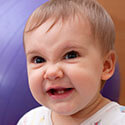Some parents are experiencing more aggressive behavior from their toddlers recently and have called us for help. What they describe is a distressing cycle of behavior that they can’t seem to stop, causing enormous parental frustration and stress. This week we will look at how this cycle can start and what parents can do about it.
How often does the following vicious cycle develop in the lives of aggressive toddlers?
- The child hits, kicks, bites, or does something else hurtful.
- A well-meaning adult quickly gives the aggressive child far too much attention in the form of warnings, lectures, or “punishments.”
- Subconsciously, the child learns that they receive the lion’s share of the attention every child craves (albeit negative attention) when they are behaving poorly.
- The child acts out more frequently to get this attention.
- Well-meaning adults quickly give the child even more attention when he/she acts aggressively.
- The cycle repeats itself over and over again, intensifying with each repetition.
Systematically attend to positive behavior
The key to breaking this dangerous cycle involves paying close attention to the child and systematically “noticing” when they are performing the behaviors we want. More specifically, this “antidote” for aggressive behavior involves the follow sequence of actions:
- When the child is behaving, move over to the child, kneel down, and smile.
- Look into their bright little eyes.
- Give them a gentle pat on the back, a “high five,” or a hug.
- Describe the positive behavior you just witnessed, using the format, “I noticed…”
Far too frequently, we heap far too much nonspecific praise upon children. The more specific and precise our description of the behavior, the more successful we will be. For example, “I noticed that you shared the red truck with Jamie” will surely yield more favorable results than, “I noticed you are being so nice and sweet.” In my presentations, I often give this tip:
Notice and specifically describe, rather than praise.
Consult with qualified medical and mental health professionals
Listed below are just a few possible causes of aggressive behavior in young children:
- Poor parenting
- Trauma in the form of abuse or neglect
- Brain damage due to closed-head injury, lack of oxygen during the birth process, prenatal exposure to drugs, alcohol, or other toxins, etc.
- Genetic abnormalities
- Other health problems
- Marital problems resulting in family instability
- Observation of aggressive peers
The list goes on. Wise parents don’t hesitate to consult with qualified medical and mental health professionals to rule out as many potential causes for the aggression as possible and treat the ones that seem to be playing a role in the problem.
Apply multiple effective interventions simultaneously
The more helpful things we do to address the problem—and do at the same time—the greater the chances of success. For example, an ineffective plan for Amy, a very aggressive youngster, might involve simply delivering a logical consequence each time she acts out.
An effective plan would involve not only delivering a logical consequence each time Amy acted aggressively, but also many other components, including limiting her exposure to TV and videos, modeling and teaching social skills, systematically attending to her positive behavior, adding family therapy, or making sure that the home and daycare are “on the same page.”
There’s great hope for little tykes who’ve fallen into the habit of terrorizing their homes and classrooms. That is, as long as the caring adults around them take immediate and decisive action. Please don’t fall into the trap of thinking that a chronically disruptive, aggressive toddler will grow out of it. The world can’t afford another violent teenager!
We hope this blog gives you some ideas you can implement with your toddler. Find more solutions to aggressive toddlers and preschoolers in Love and Logic Magic When Little Ones Leave You Speechless.
Thanks for reading!


